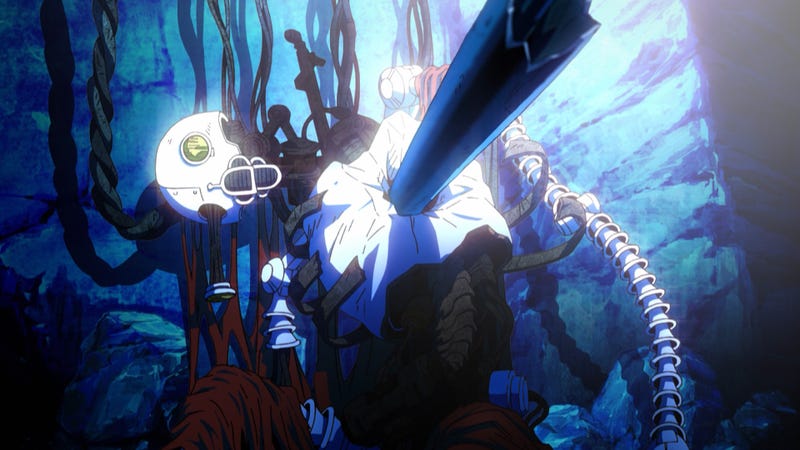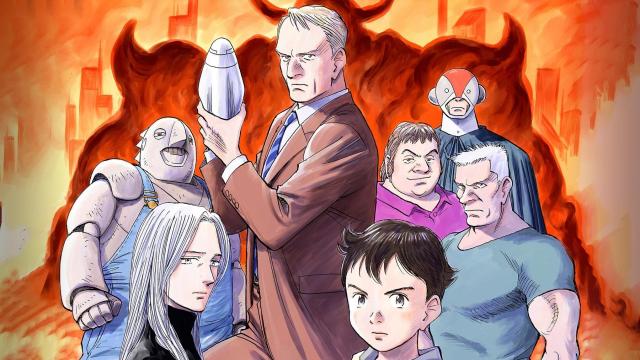While anime streaming juggernaut Crunchyroll is trying a shotgun-spread approach of releasing a wide variety of anime this season that—with a few exceptions—will likely have little to no staying power in viewer consciousness, Netflix seems to be taking fewer, smarter shots, and has struck gold with its exceptional anime adaptation of Pluto, one of the most critically praised and best-selling manga of the 2000s.
Pluto is an adaptation of an adaptation. The sci-fi story was originally a manga by Naoki Urasawa, the legendary manga author behind Monster and 20th Century Boys, which he adapted from mangaka Osamu Tezuka’s beloved robot series, Astro Boy. Now, it’s a Netflix anime. Pluto, which debuted on October 26, follows an AI detective named Gesicht as he uncovers the identity of Pluto, a serial killer challenging the most advanced robots in the world—including Astro Boy himself, Atom—to become the ultimate machine life-form. To make matters all the more gruesome, the bodies of Pluto’s victims have makeshift devil horns jammed into the heads of their lifeless bodies.
Pluto is a chilling, visionary tale that doesn’t lose itself marveling over how cool society would be if advanced artificial intelligence lived among itself. Instead, the show explores whether or not humanity is capable of constructing robots to be more human without having our hatred for one another spill into their programming.
More than your run-of-the-mill battle anime
From one perspective, Pluto’s plot is tantamount to a formulaic shonen anime tournament arc, as made famous in anime like Dragon Ball Z where strong dudes duke it out for bragging rights. However, Pluto’s Darwinistic battle to the death calls into question whether its heroes deserve the distinction of being humanity’s peacekeepers. Like Astro Boy, Pluto is set in a world in which robots are not only indistinguishable from humans, but are considered full citizens with the right to start families of their own. Unfortunately, peace between humans and robotkind is more theory than reality.
On the human side, radical hate groups akin to the Klu Klux Klan run rampant, lynching robots and pushing anti-robot propaganda through the media. Things aren’t any sweeter on the robot end of things. Although the world has pro-robo legislation, such laws only came into existence following the disastrous 39th Central Asian War, a fictional conflict in which the world’s beloved heroes wiped out thousands of their own kind because of a rumor that the nation of Persia had weapons of mass destruction. If you think that sounds an awful lot like the United State’s invasion of Iraq, you’d be right.
Not only does Pluto model its central conflict after the anxiety surrounding the U.S. invasion of Iraq, but it also holds its heroes’ feet to the fire for taking part in that war, which led to bomb strikes on civilian homes filled with sleeping innocents. Each of Pluto’s eight hour-long episodes explores how each advanced machine harbors remorse for its participation in the war and endeavors to make amends for its war crimes.
Not all of the robots go about indemnifying their past mistakes in the same way. Some robots, like Hercules and Brando, use their giant metal bodies to joust as sports entertainers in battle arenas. Others, like my favorite character North No. 2, just want to learn how to play piano with their weaponized bodies. All roads inevitably lead each mechanical marvel into battle with Pluto, who is personified as an almighty, malevolent force of nature that’s unrelenting and full of rage.

In a sea of uninspired anime, Pluto is ‘peak fiction’
Recently, the phrase “peak fiction” has been thrown around haphazardly in the anime community to the point where it has virtually lost all meaning. The term, which is shorthand for an anime faithfully adapting its source material, having stellar action sequences, and a phenomenal voice cast, was a way for seasoned anime connoisseurs to put newbies on to new shows like Chainsaw Man or ongoing series like One Piece. Now the expression has become hackneyed and co-opted as a marketing tool by media companies trying to sell prospective viewers on the promise that their show is worth sinking countless hours into.
Pluto stands as a welcome exception not only because of its faithful adaptation of Urasawa’s original work, its fast-paced action sequences, and its stellar English and Japanese voice cast, though those all help. Pluto is “peak fiction” because it recontextualizes Astro Boy as a prescient and exceedingly relevant cautionary tale about the cycle of violence. How society will justify violent acts on civilian life—be they organic or robotic—by dehumanizing the victims as vermin deserving of scorn and discrimination with no avenue for absolution.
Pluto’s finale doesn’t aggrandize itself by plucking a boilerplate solution to fictional or real-world hatred or discrimination out of its ass, either. Instead, the show holds a mirror up to the world, beckoning us to sort our own shit out before we prematurely find ourselves living among robots whose brains are just as fucked up as their creators’.

Leave a Reply